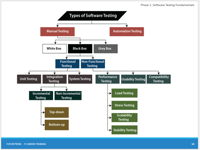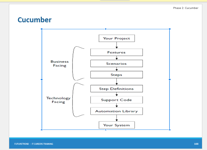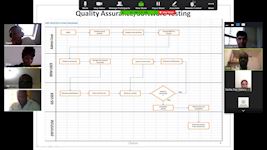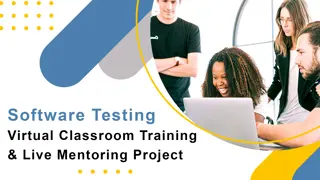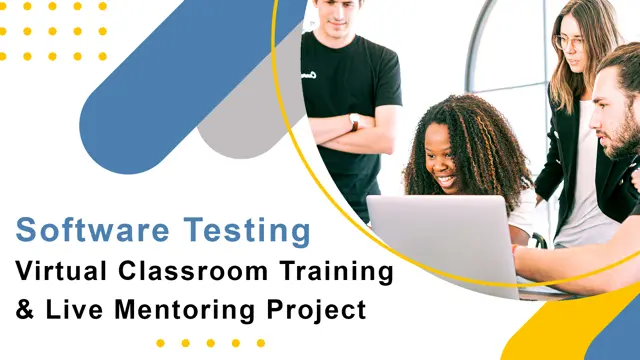
Master Software Test Automation with our Instructor-led Training
Start Your IT Journey Now! Earn £300+ a Day as a Software Tester. *Special Offer*
Futuretrend Technologies Ltd
Summary
Pay in 3 easy instalments with PayPal visit our site to find out how
- Certificate of completion - Free
- Tutor is available to students
Add to basket or enquire
Dates
Overview
Software Testing Essentials Training:
Do you want to become a Software Testing Professional earning upwards from £250 per day?
You will need to demonstrate a comprehensive knowledge of practical, real world testing scenarios and have a good grasp of automation tools which save time and staffing costs.
To stay ahead of your competitors and enhance your earning potential in today’s tough market place, your practical software testing skills need to be bang up to date.
CareerTesters (Futuretrend's Team of Software Testing Training Professionals) can help you achieve your goals through our Software Testing Essentials Bootcamp.
Course media
Description
There is a strong demand in the industry for testers with practical experience ensuring software quality. We have designed our courses to include in-depth practical learning solutions, which in turn provides candidates with hands-on skills to be productive from day one.
In addition to teaching you manual testing we now include a test automation boot camp into the course which can really make a difference to your securing employment in this sector; Automation tools like Selenium are used widely in the software testing sector for web services testing. Understanding Cucumber, Jenkins, GitHub, and Jira (for working in an Agile environment) is an absolute must have. We cover all these on the course so you can be sure you are learning the right stuff to give your CV that boost it needs to go to the top of the pile …but more importantly you will have the knowledge to back it up.
So if you are looking at getting into the industry, then this is the software testing course for you. We cover the essentials you need to know in order to get started as a professional tester with practical hands-on experience.
The practical approach we adopt for our software testing essentials course is exactly what you need to help you get a great job in this sector.
Course Outline:
Learn Software Testing Fundamentals
- STLC (Software Testing Life Cycle)
- Testing Techniques, Levels of Testing, Types of Testing, Fundamentals of Software Testing
- Test Process Selection and Analysis
- Defect Management
- Software Metrics
- Configuration Management
- Risk Management
- Test Report
Get to grips with the essential Java you need
1) Basics
- What is Java?
- How to set path in Java?
- Variable and data types in Java?
2) Control Statements in java
- Java If-else
- Java Switch
- Java for Loop
- Java While Loop
- Java Do While Loop
- Java Break
- Java Continue
- Java Comments
- Java Programs
3) Java Object Class
- Java OOPs Concepts
- Naming Convention
- Object and Class
- Constructor
- static keyword
- this keyword
4) Java Inheritance
- Inheritance (IS-A)
- Aggregation (HAS-A)
5) Java Polymorphism
- Method Overloading
- Method Overriding
- super keyword
- final keyword
6) Java Abstraction
- Abstract class
- Interface
- Abstract vs. Interface
7) Java Encapsulation
- Package
- Access Modifiers
- Encapsulation
8) Java Array
- Java Array
9) Java OOPs Misc.
- Wrapper Class
10) Java String
- What is String
- Immutable String
- String Comparison
- String Concatenation
- Substring Methods of String class
- StringBuffer class
- StringBuilder class
- String vs StringBuffer StringBuffer vs Builder
- Creating Immutable class toString method
11) Exception Handling
- What is an Exception?
- try and catch block
- Multiple catch block
- Nested try
- finally block
- throw keyword
- Exception Propagation
- throws keyword
- Throw vs Throws
- Final vs Finally vs Finalize
12) Java Collections
- Collection Framework
- Java ArrayList
- Java LinkedList
- ArrayList vs LinkedList
- Java List Interface
- Java HashSet
- Java LinkedHashSet
- Java TreeSet
13) Java Map Interface
- Java HashMap
- Java LinkedHashMap
- Java TreeMap
- Collections class Sorting
- Properties class
14) Java I/O
- Java Input/Output
- FileOutputStream, FileInputStream
- BufferedOutputStream, BufferedInputStream
15) Java 8 Date Time
Maven:
- What is Maven and Why Maven?
- Installing/Configuring Maven
- Creating Maven Project
- Importing Maven Project into Eclipse
- What is POM.xml?
- Adding Dependencies to POM.xml
- Maven Goals
Phase 2
Automating Selenium Operations on various Elements
Browser
- TextBox
- ListBox
- Links
- Check Box
- Radio Button
- HTML Tables
- Calendars
Automating Keyboard and Mouse Events
- Action Class
- KeyBoard Events
- Drag & Drop Actions
- Mouse Hover Action
- Right Click, Double Click & Tool Tip
Handling multiple Windows
- getwindowHandle()
- getwindowHandles()
- Switching between windows
Handling elements present in different windows
- Handling Alerts
- accept()
- dismiss()
- getText()
- sendKeys()
Handling Frames
- What is iFrame?
- Locating Frames
- Switching between Frames
- Handling Frames
- Handling Ajax Components
- Creating Customize XPath/CSS Selectors
What is XPath?
- When to Use XPath
- Absolute XPath/Relative XPath
- Specifying conditions with XPath
- CSS Selectors
- Customizing CSS Selector
Synchronization
- ImplicitWait
- Explicit Wait
- FluentWait
- PageLoadTimeout
TestNG
- What is TestNG?
- Advantages of TestNG over JUnit
- Why do we need TestNG in Selenium?
- Installing TestNG in Eclipse
- Creating a New TestNG Test File
- Test annotation
- Running the Test
- Checking reports created by TestNG
- Generating HTML Reports
- Annotations used in TestNG
- Validating Tests with Assertions
- Creating multiple Tests
- Prioritizing Tests
- Parameterizing Tests with data Provider
- TestNGdataProvider with Excel
- Creating and Running Test Suites with TestNG.xml
- Parallel Test Execution with TestNG
- Cross Browser Testing using TestNG
LOG4J
- Introduction about Logging
- Logging problems without Log4J
- How to solve Logging problem with Log4J
- What is Layout?
- Different types of Layouts in Log4J
- What is Appender?
- Different types of Appenders
Cucumber
- Cucumber Basics-Features
- Gherkin
- Background
- Annotations
- Step definitions
Cucumber hooks - Before and After
- Scenario
Framework:
- Selenium Automation Framework creation from Scratch
Using Lightning Components. - API Automation Framework creation from Scratch
Phase 3
Project manage your Test effort
Source Code Management
- Git Basics
- Commands:
- add,push,commit,fetch,merge,ConflictResolution
Git Hub Operations, Pull Request reviews, Team Collaboration
JENKINS
- Installing/Configuring Jenkins
- Scheduling Test Execution in Jenkins
- Auto mail configuration in Jenkins
- What is continues integration?
- Continues integration with JENKINS
Testing Methodology and project Management Tools
- Agile Process, Agile Pyramid, Agile Basics
- Agile-Scrum, Kanban Basics
- Project Management Tool: Jira
- Test and Defect Management Tool
Project Experience and Mentoring Projects
We understand the challenges that most people looking for a career as a software tester will face. The main problem is that even though you have had extensive training and are up to speed with all the theories and methodologies...what you lack is that solid end-to-end live project experience.
As part of this training programme, we are able to provide this work experience/Mentoring program that is embedded into the latter stages of course and not at the very end
Please note that the Practical Projects are run during the latter stages of course and not at the very end
Project 1: UI Automation- Ecommerce Domain Project using Cucumber and Selenium with at least 50 + test cases
Project 2: API Automation Project-Ecommerce Domain using Cucumber and Rest Assured-with at least 50 + test cases
Our Courses run on our Virtual Classroom platform
The Virtual Classroom is very much the same as the classroom version except its delivered via video conference; so you are training from the comfort of your own home rather than traveling to the centre.
All learners and tutors will login to our Virtual Classroom via Zoom.
On registration, we will give you access to our virtual learning zone prior to attending our course. You will find tons of documents, resources, exercises and tests to prepare you ahead of the practical classroom training. This resource area also Includes mock tests that will help you towards the ISEB/ ITSQB exam if you want to pursue this.
Who is this course for?
Aspiring software testers, quality assurance engineers, anyone with good IT knowledge looking for the best way to get a foot in the industry, business analysts that want to add software testing and quality assurance to their skillset, project managers that want to add software testing and quality assurance to their skillset
Requirements
You should be familiar with MS Word, Excel, PowerPoint and have good all round IT skills. Programming knowledge is not essential but any experience with this could be useful
Career path
Software testers go on to become quality assurance engineers, lead software test analysts, software test managers etc
Questions and answers
Certificates
Certificate of completion
Digital certificate - Included
Reviews
Currently there are no reviews for this course. Be the first to leave a review.
Legal information
This course is advertised on reed.co.uk by the Course Provider, whose terms and conditions apply. Purchases are made directly from the Course Provider, and as such, content and materials are supplied by the Course Provider directly. Reed is acting as agent and not reseller in relation to this course. Reed's only responsibility is to facilitate your payment for the course. It is your responsibility to review and agree to the Course Provider's terms and conditions and satisfy yourself as to the suitability of the course you intend to purchase. Reed will not have any responsibility for the content of the course and/or associated materials.


